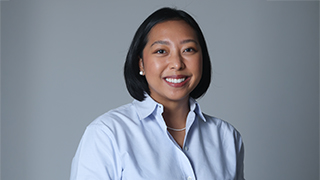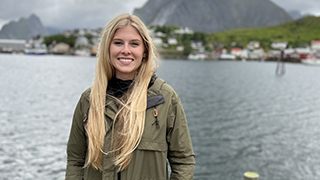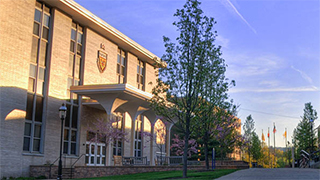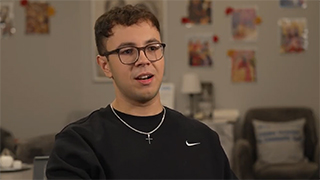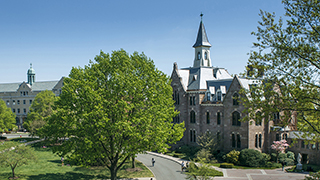Palestinian Ambassador to the UN Speaks on Middle East Peace Plan
Wednesday, December 2, 2020
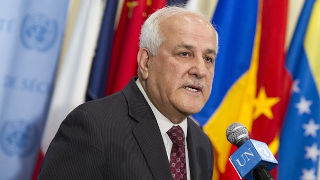
Dr. Riyad Mansour, Ambassador and Permanent Observer of the State of Palestine to the UN, spoke to students from the School of Diplomacy in November.
On November 19, the School of Diplomacy and International Relations held a discussion on the Middle East Peace Plan with Dr. Riyad Mansour, Ambassador and Permanent Observer of the State of Palestine to the UN. Ambassador Mansour delivered remarks about the Palestinian perspective on the conflict in the Middle East and answered questions from attendees.
The ambassador began his remarks by reaffirming the Palestinian government's commitment to establishing peace with Israel. He recounted the history of Palestine, saying that the UN did not grant it independence in 1947. Additionally, he criticized General Assembly Resolution 181, the UN's partition plan for Palestine, "because it allowed for the creation of Israel" and did not give Palestine independence, which, he said, "prevented justice from being given to the Palestinian people."
Mansour asserted that Palestine has a right to self-determination and independence on the basis of international law. Mansour added that "settlements and transferring of the civilian population of the occupied territory to the occupied land is illegal, and according to the ICC, a war crime. We want to move toward peace. International law is on our side, the side of justice."
Ambassador Mansour stated that Palestine is "ready and willing to accept the two-state solution," citing how Resolution 181 included parameters that divided the land into two separate states. The ambassador said that in the pursuit of a two-state solution, "Palestine and its leadership have made historic compromises, but we do not see reciprocation from others."
Mansour then criticized the Trump administration for "deviating from the global consensus." In the past, Mansour condemned the Trump administration's stance on Israeli settlements and abandoning the two-state solution. Additionally, the ambassador criticized Secretary of State Mike Pompeo for being "the first secretary of state to visit an illegal settlement," which sends "a very wrong sign."
Mansour said that he hopes President-elect Joe Biden's administration will make the "necessary corrections" to end occupation, grant Palestine independence, and live the reality of the two-state solution. He believes that this will help both sides move away from conflict and "work toward rebuilding development, innovation, and creativity" to create a better future for posterity.
Mansour ended his talk declaring that his people deserve better than their current situation. "The Palestinian people will not vanish. We have been living in that land since the beginning of history. We are the people who stayed, including the last 2000 years. We cannot be treated as if we are alien to this land."
After the speech, attendees had the opportunity to ask the ambassador questions. One student inquired about how to make an independent Palestine economically less reliant on Israel. Mansour stated that under Israeli occupation, a solution to this issue is not possible because Israel is controlling Palestinian natural resources. He claimed that many studies show that Israel is stealing an average of $10,000,000 from the Palestinian economy annually.
When asked about the best alternative to the two-state solution, the ambassador stated: "we do not believe that the one-state solution would be a working solution" and that "the two state solution is the only realistic and possible solution - to separate, and once we separate, accept each other as equals."
Another attendee asked Mansour about recent collaboration efforts between Palestine and Israel. The ambassador related this question back to Israeli occupation, and he argued that "occupation must be put to an end because it is oppressing a whole nation. We want our freedom. We do not want to live under the control of an occupying power."
During the program's question and answer segment, Mansour brought returned to the history of the conflict. He described how colonial powers facilitated the movement of Jewish people from Europe to Israel, "filling Jews with negative feelings towards Arabs." He also noted that Jews and Palestinians originally had friendly relations when Jews began settling in the territory, The atmosphere changed, he said, when movements prevented Jews from integrating with the local population. Additionally, the Ambassador Mansour said that antisemitism was not created by Palestinians but is a European-made phenomenon.
After the event, Dean Courtney Smith stated that what stood out to him was the way students interacted with Ambassador Mansour and how they reacted to what he said.
"Each time we bring in speakers, we have gotten some sort of pushback. If you want peace in the Middle East, you are not going to want to build that by bringing in one perspective, and the ambassador's job was to represent the Palestinians at the UN. As long as you have an open dialogue, the event is a success. We want people to leave with a different perspective they have not thought about before."
Categories: Arts and Culture


